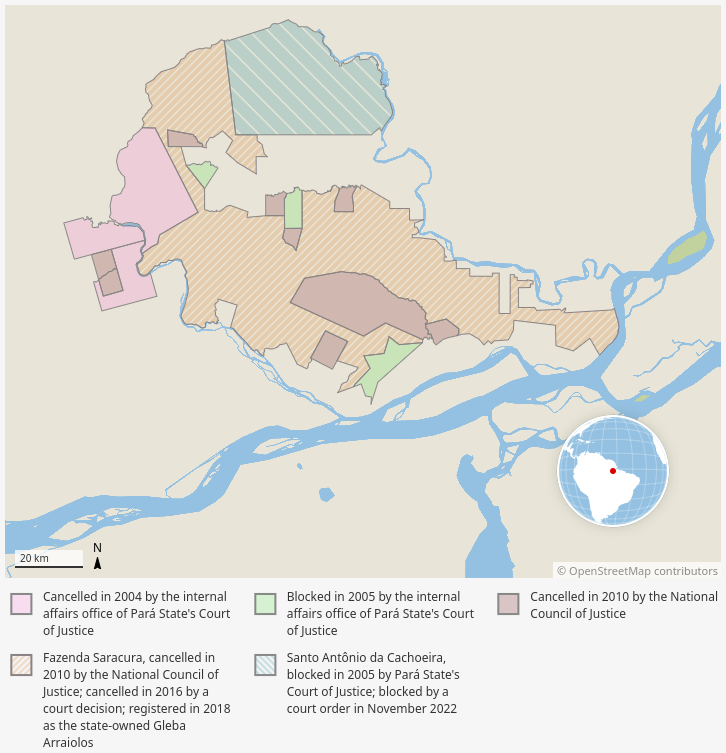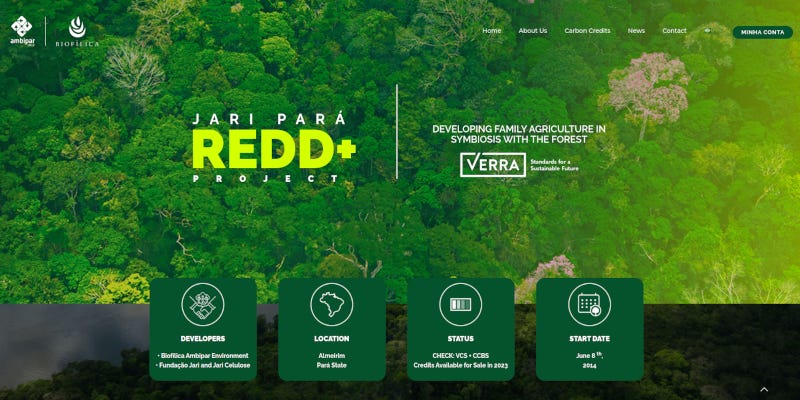An investigation by Context, owned by the Thomson Reuters Foundation, revealed that the Jari Pará REDD+ project has sold carbon credits from publicly owned land without state authorisation.
In 2020, Verra approved the project to issue approximately 525,000 carbon credits per year. The project covers almost 500,000 hectares, making it Verra’s largest registered project, by area, in Brazil.
Buyers of the offsets include Belgian pharmaceutical firm Janssen, US multinational 3M, US media company CNN, Danish pharmaceutical firm Novo Nordisk, German software company SAP, German car manufacturer BMW, Brazilian media firm Globo, and Brazilian bank Bradesco.
In response to Context’s investigation, Verra has started a review of the Jari Pará REDD+ project and issuance of carbon credits from the project is on hold.
The Jari Pará REDD+ project is managed by two companies: Jari Celulose, a pulp company, and Biofílica Ambipar Environment, a carbon offsetting company.
Illegal logging: FSC disassociated from Jari Group in 2019
In 2015, REDD-Monitor wrote about another REDD project in the Jari Valley, the Jari Amapá REDD+ project. That project involved another member of the Jari Group - a logging company called Jari Florestal.
In 2015, the Public Prosecutor’s Office (MPF) put out a notice about an investigation into Jari Florestal under the headline, “Major exporters of wood working in Pará are suspected of using forest credits to ‘warm up’ illegal timber”.
In 2019, the Forest Stewardship Council disassociated from the Jari Group because of its involvement in illegal logging and the failure to recognise the existence of traditional communities inside its management area. The Jari Amapá REDD+ project remains registered on Verra’s project database and is still issuing carbon credits.
Biofílica issued the Project Description for the Jari Pará REDD+ project on 7 October 2019. The Forest Stewardship Council disassociated from the Jari Group in March 2019. FSC suspended all certificates held by the Jari Group in September 2017, while an investigation into the company’s operations was carried out.
Yet the only mention that Biofílica makes of FSC certification in its Project Description is the following:
“In 2000, the project was managed by the Orsa Group, and after processes of modernization of the production chain, acquisition of new technologies and planning of native forest management, became economically viable and in 2004 received the Forest Stewardship Council certification – FSC.”
The fact that FSC had disassociated from the Jari Group, because of the company’s involvement in illegal logging should have been a red flag for Verra. But apparently not. The Italian auditing company RINA Services S.p.A. issued its validation report on 15 October 2019. RINA made no mention whatsoever of FSC in its validation report.
Invalid claim to land
A Brazilian prosecutor, a Pará state attorney, and researchers told Context that the Jari Pará REDD+ project has sold carbon credits based on an invalid claim to a land parcel called Fazenda Saracura, that covers 386,000 hectares. The land was registered as public property in 2018. As such, the project contravenes Brazilian law.
Ibraim Rocha is a Pará state attorney who has been involved in the case for more than 10 years. He told Context that there is “no doubt” that the area is now “state property” and that Jari Celulose has no legal right to the land and can’t carry out a carbon project there. Brazil’s forest code, and the country’s legislation on sustainable production in public forests, state that companies can only operate on the land with state permission.
Context produced a map illustrating 17 land certificates, all blocked or cancelled (as of 7 March 2023) where the REDD project operates:

When a land certificate is blocked it cannot be sold without a court authorisation.
Jari Celulose and Biofílica claim that they have sufficient control over the land that, according to Verra’s rules, they can sell carbon credits generated by their forestry operations on the land.
“Carbon land-grabbing”
Research by Context’s journalist André Cabette Fábio revealed that in 2012 a state court found that Jari Celulose did not own Fazenda Saracura. The land title was cancelled in 2016. And in 2018, the state registered Fazenda Saracura as public property. It’s name was changed to Gleba Arraiolos.
State attorney Rocha told Context that the Jari Pará REDD+ project shows “we have still not faced up to the problem of land-grabbing in the Amazon”. He added that, “Carbon credits are making it more complicated.”
And he described sourcing carbon credits from public land as “carbon land-grabbing”.






Let's call it what it is: Sourcing carbon credits from public lands is fraud. Might as well source forest credits from the ocean.